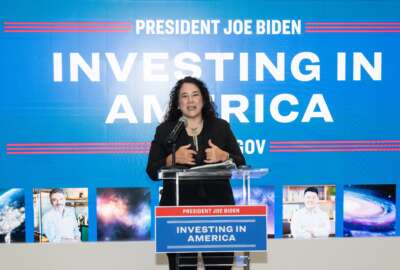Sen. Grassley puts hold on Biden’s deputy VA pick
In today's Federal Newscast: Senator Chuck Grassley (R-Iowa) puts a hold on President Biden's pick for VA deputy secretary. It looks like the Space Force will...
- The federal government is setting a new record for overall small business contract spending. More than a quarter of federal contracting dollars went to small businesses last year. That is well above a 23% goal set governmentwide. Ten agencies earned an A-plus on the Small Business Administration’s contracting scorecard, and another 10 received A's. SBA Administrator Isabel Guzman said small business owners in the federal marketplace support over a million jobs, including jobs in manufacturing, construction, and research and development.
(Agencies making ‘substantial progress’ toward higher small, disadvantaged contracting goal - Federal News Network)
- The Transportation Security Administration is bringing new technology leaders onboard. TSA will soon announce a Chief Data Officer position. The CDO is expected to play a crucial role as the agency increasingly looks to adopt artificial intelligence capabilities, according to TSA Deputy Chief Information Officer Kristin Ruiz. “And this position will be a key position for us, as we further build out our open architecture and begin to leverage AI/ML,” Ruiz said during a July 18 webinar hosted by ACT-IAC. “We won't be able to do that without this key person.” And, later this month, TSA will begin conducting interviews to hire an Executive Director of IT Delivery.
- President Joe Biden’s pick to serve as second-in-command at the Department of Veterans Affairs has hit a roadblock. Sen. Chuck Grassley (R-Iowa) has put a hold on VA Chief of Staff Tanya Bradsher’s nomination to serve as VA deputy secretary. Grassley said Bradsher didn’t follow up with VA whistleblowers who claimed retaliation at the department, over their assertions that a VA system exposed veterans’ sensitive personal and medical information. Grassley said the Office of Special Counsel already found “substantial likelihood of wrongdoing” that the VA violated federal privacy laws.
(Grassley speaks on decision to hold "business as usual" VA nominee Tanya Bradsher - Sen. Chuck Grassley (R-Iowa))
- A new cohort of fellows will join the General Services Administration's U.S. Digital Corps this year. The 48 new fellows will support 13 different agencies as part of a program first launched last summer. They will be joining 38 other fellows from the inaugural year of the program, who are now entering their second year of service. GSA selected this year's cohort from close to 1,400 applicants. The Digital Corps Fellowship Program offers temporary positions to early-career technologists, with the potential to eventually convert into a full-time career. The fellows are bringing skills in software engineering, product management, design, data science and analytics and cybersecurity.(GSA welcomes second annual cohort of U.S. Digital Corps fellows - General Services Administration)
- It is looking very likely that the Space Force will become the first military service with its own personnel system. Language that would set it up is part of the defense authorization bill, on which the Senate is expected to vote this week. The new system was first requested by the Pentagon, and the House has already approved a similar provision. Among other changes, the arrangement would eliminate the distinction between active and reserve servicemembers. The idea is to let Guardians move a bit more freely between full-time and part-time uniformed service, and allow easier transitions between public and private sector work.(S.2226 - National Defense Authorization Act for Fiscal Year 2024 - U.S. Congress)
- The Defense Department does not have enough accurate data from its COVID-19 registry to make public health and clinical care decisions, according to a report from the Pentagon's inspector general, who found errors in patient records and said the information was inaccurate and potentially misleading. The IG recommended a policy for developing and populating patient registries, as well as conducting a review of all the registries in the Military Health System to verify the reliability of the data. The Defense Department did dispute some of the IG's findings.
- A major federal cybersecurity law is inching closer to its first update in nearly a decade. On Tuesday, Senate Majority Leader Chuck Schumer (D-N.Y.) filed the Federal Information Security Modernization Act of 2023 (FISMA), as an intended amendment to the annual defense authorization bill. The legislation would be the first update to federal cybersecurity law since the last FISMA reform bill passed in 2014. It would codify the federal chief information security officer position into law, and provide the Cybersecurity and Infrastructure Security Agency with more authorities to respond to cyber incidents on federal networks. (Schumer amendment intended to be proposed to NDAA - Congressional Record)
- The Defense Information Systems Agency (DISA) said it has revolutionized its acquisition process for buying new technology. When it awarded contracts to four technology companies to provide services in support of its Joint Warfighting Cloud Capability, it completed the transaction in 17 months. DISA program manager Ryan McArthur said in the past that process would have taken at least 36 months. He said breaking down acquisition teams to create a more agile approach and changing the task order process shortened the timeline. It is a system DISA can now use to field new capabilities on a faster timeframe.
- The Federal Labor Relations Authority (FLRA) has blocked an effort to allow individual decertification petitions for recently consolidated bargaining units. The case dates back to 2021, when National Park Service employees working in the Blue Ridge Parkway petitioned the FLRA to combine two bargaining units and become a consolidated local within the American Federation of Government Employees. But a bargaining unit member then petitioned to decertify the new unit, with support from a conservative group, the National Right to Work Legal Defense Foundation. After a lot of back-and-forth, the FLRA recently ruled that its own regulations prohibit individuals from filing decertification petitions within 12 months of the creation of a new bargaining unit. (AFGE wins union election - American Federation of Government Employees)
Copyright © 2025 Federal News Network. All rights reserved. This website is not intended for users located within the European Economic Area.
Peter Musurlian
Peter Musurlian is a producer at Federal News Network.
Follow @PMusurlianWFED
Related Stories
Exclusive
Inside the IC
Read more






